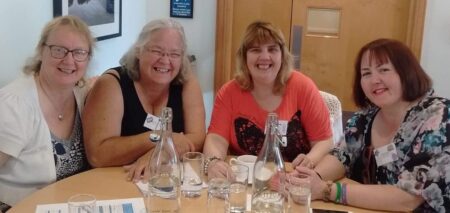Home News & Views My dream job: Being an acute learning disability liaison nurse
My dream job: Being an acute learning disability liaison nurse
Linda Phillips, Acute Liaison Nurse, Hywel Dda University Health Board

Linda left, with Laura Andrews, Angie Edwards and Lindsey Davies
It’s been six months since the Learning Disability Health Liaison service was established in our Health Board and I took up my dream job as learning disability liaison nurse. Although the benefits of having specialist learning disability nurses working in general hospitals has been well documented (MacArthur et al, 2015; Brown et al, 2012; Castles et al, 2013) the provision of this service has always been patchy and not always seen as a priority. Mencap have long campaigned for learning disability liaison nurses in every hospital (Getting it right, 2011; Treat me well, 2018) and slowly but surely this is now becoming a reality.
So what does an acute learning disability liaison nurse do? The actual role may vary between different hospitals, but fundamentally the principles are the same. The aim is to reduce health inequalities and provide better health care and outcomes for people with a learning disability when they come into hospital. This is achieved by supporting the patient with a learning disability, providing education and advice to ward staff and being involved in strategic planning. The support a learning disability liaison nurse provides is person-centred and depends on what the patient needs at that time. The emphasis is on ensuring the correct reasonable adjustments are in place, and may include providing pre-admission visits to the hospital to allay fears, ensuring information is provided in an accessible format or supporting the person’s family or carers so they can stay with them during their admission. Learning disability liaison nurses also act as a resource to ward staff and can be contacted to give advice about communication, behaviour or any other aspect of learning disabilities.
I mentioned earlier that this is my dream job. I feel in such a privileged position to do what I am passionate about and really enjoy as a career. As well as being a learning disability nurse (and have been for over 30 years!) I’m also Mum to our daughter who has a profound learning disability and complex health needs. We have had our share of hospital admissions, some good and others not so good so I can speak from experience about what works and how best to provide care. I feel honoured to work alongside ward staff who want to make a difference and are eager to learn how to improve things, something I can do as nurse but not as a Mum.
Next time you have a patient with a learning disability admitted to your ward, contact your acute learning disability liaison nurse (if your hospital employs one) or community learning disability nurse who will be able to offer advice and reasonable adjustments, so the person receives the best possible experience and outcome of hospital care. You never know, you may be nursing my daughter, but if not, it will be someone else’s son, daughter, brother, sister or friend.
References
Brown M., MacArthur J., McKechanie A., Mack S., Hayes M. et al. (2012) Learning Disability Liaison Nursing Services in south-east Scotland: a mixed-methods impact and outcome study. Journal of Intellectual Disability Research, 56: 1161-74.
Castles, A., Bailey C., Gates, B. and Sooben, R. (2013) Experiences of the implementation of a learning disability nursing liaison service within an acute hospital setting: a service evaluation. British Journal of Learning Disabilities, 42: 272-281
MacArthur J., Brown, M., Mckechanie, A., Mack S., Hayes, M. and Fletcher, J. (2015) Making reasonable and achievable adjustments: the contributions of learning disability liaison nurses in ‘Getting it right’ for people with learning disabilities receiving general hospitals care. Journal of Advanced Nursing, 71(7): 1552-1563.
Mencap (2011) Getting it right: the charter explained. Mencap: London.
Mencap (2018) Treat me well: simple adjustments make a big difference. Mencap: London.
Comments are closed.

